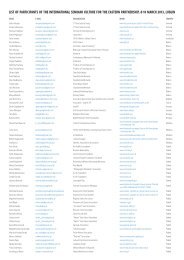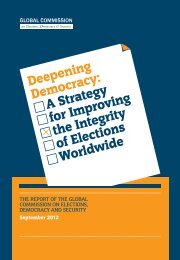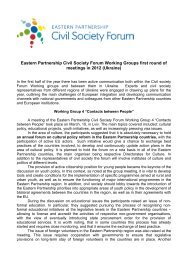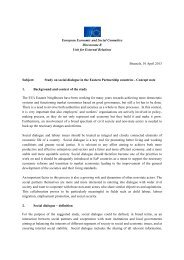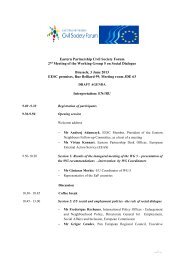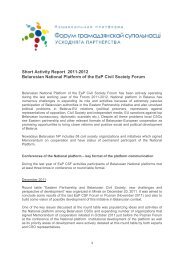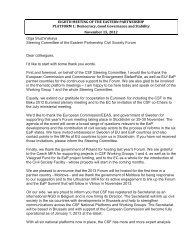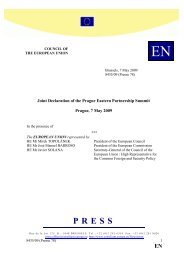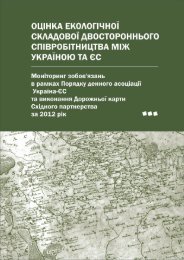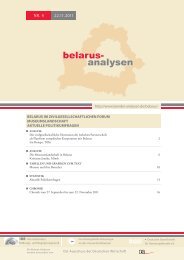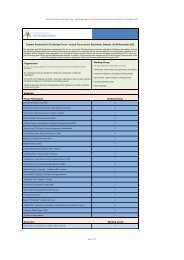Non-formal education - Eastern Partnership Civil Society Forum
Non-formal education - Eastern Partnership Civil Society Forum
Non-formal education - Eastern Partnership Civil Society Forum
You also want an ePaper? Increase the reach of your titles
YUMPU automatically turns print PDFs into web optimized ePapers that Google loves.
DEAR FRIENDS!<br />
The idea of the project was emerged from discussions in the newly formed sub- group on <strong>education</strong><br />
of Group 4 “Contacts between people” of <strong>Civil</strong> <strong>Society</strong> <strong>Forum</strong> of the <strong>Eastern</strong> <strong>Partnership</strong> (Poznan,<br />
Poland, November 28 – 30, 2011). Formation of a specified subgroup was quite natural, as among<br />
participants of the Third Meeting of the <strong>Forum</strong> from both EaP and EU countries there were a lot of those<br />
whom issues of <strong>education</strong> are a matter of life and professional interest for.<br />
<strong>Non</strong>-<strong>formal</strong> <strong>education</strong> as an important component of lifelong learning has been defined in the<br />
discussion as a framework problem because it:<br />
– defines the interaction between civil society, NGOs and the government, as well as with <strong>formal</strong><br />
<strong>education</strong>;<br />
– makes it possible to involve different social groups (including those that require special<br />
treatment and attention) and different ages (from children and young people up to the category<br />
of “45 +”) into the <strong>education</strong>al process;<br />
– is one of the priority components of social change (such as lifelong learning) in the EU. But is<br />
not yet the norm for the EaP countries. And non-<strong>formal</strong> <strong>education</strong> can correct this situation.<br />
But over the last decade, the field of <strong>education</strong> in the former Soviet Union, <strong>Eastern</strong> <strong>Partnership</strong><br />
countries in particular, had passed a number of significant changes: from the emergence of private<br />
institutions, changed system of knowledge assessment and duration of schooling to the national<br />
framework of qualifications and changes in the system of scientific degrees.<br />
And trying to work out a common strategy we have come to comprehension that there is no overall<br />
picture, no common view of the situation with non-<strong>formal</strong> <strong>education</strong>, with a policy of “lifelong learning”.<br />
Preparing an overview of each of the <strong>Eastern</strong> <strong>Partnership</strong> countries and the comparative analysis<br />
of non-<strong>formal</strong> <strong>education</strong> has been possible thanks to the financial support of the Ministry of Foreign<br />
Affairs of the Czech Republic.<br />
Overall coordination of the project was provided by Ukrainian NGO Europe XXI Foundation<br />
(representing by Galina Usatenko). Association of additional <strong>education</strong> and enlightenment of Belarus<br />
(representing by Dmitry Karpievich), the social organization of the Armenian Union of <strong>Civil</strong> Servants<br />
(representing by Vache Kalashian) and the Institute for International Cooperation of the German Adult<br />
Education Association (representing by Bettina Brand) were partners in the project.<br />
Getting started a review, we were aware that there are national characteristics of <strong>education</strong> reforms,<br />
but there were some common pain points and overall trends. To determine these pain points, find<br />
solutions to problems, and also for the formation of national <strong>education</strong> policies in the context of regional<br />
policy and European transformations in <strong>education</strong> our cooperation was guided.<br />
The Findings<br />
At the meeting in Kiev on October 14-15, 2012 when all the members of our collaborators and expert<br />
working groups have tried to develop general recommendations on, the main thesis sounded, “We are<br />
all different and everything in our <strong>education</strong> is different. And that is, what we have in common”.<br />
But then we found that the role of non-<strong>formal</strong> <strong>education</strong> was the key for our region, for the countries<br />
of the <strong>Eastern</strong> <strong>Partnership</strong>: to improve quality of life, and for the formation of a worldview in our societies<br />
and the culture of “lifelong learning”, and for the formation of civil society, which NGOs are competent<br />
and effective, and required providers of <strong>education</strong>al services in.<br />
Attention to non-<strong>formal</strong> <strong>education</strong>, initiated by our group in the framework of the <strong>Civil</strong> <strong>Society</strong> <strong>Forum</strong><br />
of the <strong>Eastern</strong> <strong>Partnership</strong>, is an important component for work in each of the countries. For example,<br />
3



